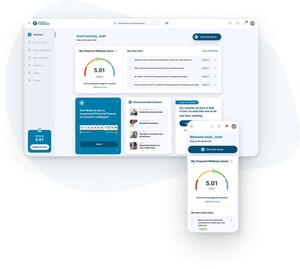Financial Finesse Releases Two Reports Advancing the Industry's Understanding of Financial Wellness Disparities in the Workplace
Across both studies, financial resilience popped as a strong determinant of financial wellness. For employers focused on elevating vulnerable employees, the data is clear: start with resiliency.
- Despite the COVID-19 pandemic, the financial health of American workers with access to financial wellness programs edged up in 2020.
- Cohorts most likely to experience "high" or "overwhelming" financial stress posted the highest net improvement in financial resilience, yet by race and gender, significant disparities persist.
- Employers can help close racial and gender gaps with proven financial wellness programs.
EL SEGUNDO, Calif., May 25, 2021 /PRNewswire/ -- Financial Finesse, the leading independent provider of workplace financial wellness benefits, today released its 2020 Financial Wellness Year in Review (YIR), which looks at employee financial resilience during COVID-19, and a companion Race and Financial Stress Special Report, which looks at racial disparity in financial wellness. Financial resilience, which the firm defines as the ability to bounce back from an unforeseeable financial setback, is one of the strongest contributing factors to financial wellness.
To better understand financial resilience, Financial Finesse assigned employees studied to one of four groups—the financially resilient, susceptible, determined, and vulnerable—based on the presence or absence of an emergency fund prior to and during 2020. The analysis showed:
- Financial Resiliency is Sticky (and Attainable): Ninety-four percent of employees that had an emergency fund prior to 2020 maintained it, and 26 percent of employees who needed an emergency fund acquired one in 2020.
- Cash Flow and Debt Management Are King: Employees who have a handle on cash flow and an emergency fund are 17 times more likely to report "no" financial stress and 4.5 times more likely to be comfortable with their debt than those with neither.
- Minorities and Woman Made Great Strides: Black, Hispanic and female employees, and those with lower HHIs (<$60,000), experienced the highest net improvement in financial resilience.
- Significant Disparities Still Exist: For example, single, Black moms are 7 times more likely to have high or overwhelming financial stress than married, Asian dads.
"There is no mistaking the influence that cash flow and debt have on financial resilience," said Financial Finesse Founder and CEO, Liz Davidson. "For employers seeking to improve financial well-being across their organizations, with focused attention on those who need help most urgently, integrating a holistic financial wellness benefit built to tackle proven determinants of financial resiliency with personalized and ongoing coaching, is an effective, ROI-positive way to take action."
Craig Copeland, Senior Research Analyst for the Employee Benefit Research Institute (EBRI) commented, "Debt is one of the biggest factors affecting workers' retirement expectations and ability to save or prepare for retirement." According to EBRI's Retirement Confidence Survey, workers who are comfortable with their debt are nearly twice as likely to be confident about their retirement, and 55 percent more likely to have saved for retirement, than workers who consider debt to be a major problem. He adds, "Getting debt under control and focusing on financial resiliency during one's working years can make all the difference in having a financially comfortable retirement."
Financial Finesse's Race and Financial Stress Special Report digs deeper into the economic and financial wellness disparities that persist among racial minorities. The report's findings are already being embraced by Financial Finesse partners to optimize their financial wellness programs. "It's refreshing to see so many organizations commit to solving the racial wealth gap," said Laura Finn, the report's author and a Senior Consultant at Financial Finesse. She continues, "Understanding, then solving for the underlying financial wellness issues is key to bringing all of us closer to financial equality."
"Our reporting shows that employees with an emergency fund and a handle on cash flow are one-tenth as likely to experience unmanageable levels of financial stress," says Greg Ward, CFP® and Director of the Financial Finesse Financial Wellness Think Tank™. "Historically, women, African American and Hispanic employees, and single parents have reported the highest levels of financial stress. This suggests that targeted outreach to stressed populations should focus on cash flow and savings for maximum stress reduction." Davidson adds, "By committing to helping employees reduce financial stress, employers improve their competitiveness, especially in tight labor markets like we are experiencing right now. In the war for talent, company culture is a critical factor."
For more information:
Download the full "2020 Financial Wellness Year in Review" here.
Download the full "Race and Financial Stress Special Report" here.
About Financial Finesse:
Financial Finesse is the country's leading independent provider of unbiased workplace financial wellness programs. Since 1999, the firm has helped over 10,000 organizations improve their bottom lines and become more competitive by empowering their employees to achieve financial security. The company's award-winning financial wellness programs are made available to employees at no cost as an employer-sponsored benefit. With highly personalized and ongoing one-on-one coaching from CFP® professionals, AI-powered virtual coaching, live workshops, webcasts, educational tools and content, Financial Finesse reaches over 2.4 million individuals every year. www.financialfinesse.com
Contact: Maggie Weinberg, Financial Finesse
Email: [email protected]
Cell: 917.370.2220
SOURCE Financial Finesse

Related Links
WANT YOUR COMPANY'S NEWS FEATURED ON PRNEWSWIRE.COM?
Newsrooms &
Influencers
Digital Media
Outlets
Journalists
Opted In






Share this article